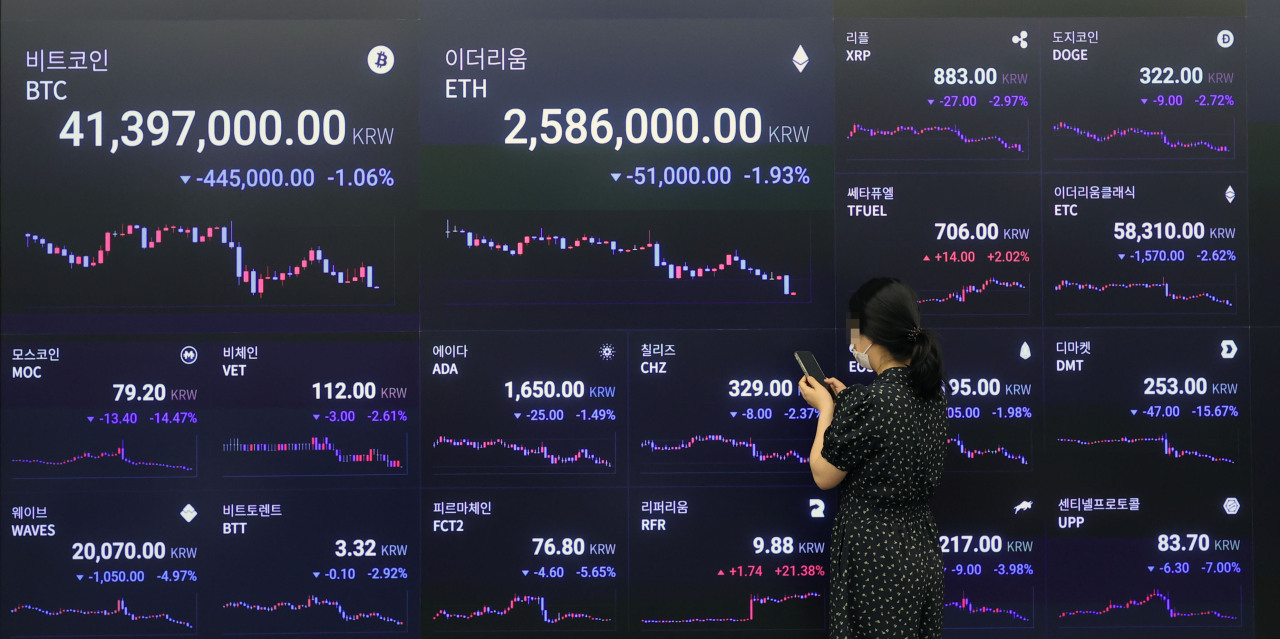Crypto exchanges with ‘too many’ coins likely to be denied real-name accounts
By Jung Min-kyungPublished : June 28, 2021 - 15:39

Cryptocurrency exchanges in South Korea considered to have “too many” coins on their trading platforms are apparently at risk of being denied access to personal bank accounts here, a report showed Monday.
In a document acquired by a lawmaker here, a risk assessment guideline to be used by commercial lenders here classifies exchanges with “a high number and frequency of virtual money transactions” as high risk.
The guideline was drawn up in April by the Korea Federation of Banks, a body that represents 22 full members, including major commercial banks and state-run lenders, as well as 36 associate members. The guideline appears intended for use in the process of real-name account issuance, the report released by Rep. Yoon Doo-hyun of the main opposition People Power Party showed.
The document comes as commercial banks here remain reluctant to issue real-name accounts for local cryptocurrency exchanges’ virtual asset customers. A recent amendment to the Act on Reporting and Using Specified Financial Transaction Information requires the exchanges to find banks willing to partner with them to issue the accounts. Banks would thus be responsible for screening the exchanges to assess risks and transparency. Exchanges that fail to find a partner will be placed at risk of being shut down.
Other criteria that could deem an exchange “high-risk” would be the number of different listed coins with “low-credibility” and to what extent the platform provides “other financial services besides regular transactions.”
The nationalities of their virtual asset customers, their occupations and the respective proportions of customers in each group will be used to assess the risks of the exchanges as well, the report showed.
While the specific nations deemed as “high-risk” were unrevealed, customers working in the “private loan shark” business or the gambling industry were occupations classified as such.
The guideline also called for the banks to look into any fraud or records of crimes by the exchanges’ operators and leadership to assess their soundness.
Despite the guideline, the report said that the KFB allowed each banks to set their own specific scores and ranks for the assessment, indicating they would leave the final decisions up to each lender.
Yoon said that the KFB must allow the virtual asset customers and investors to know the specific criteria they have set for the real-name account assessment.
More than half of the certified exchanges here, meanwhile, have been removing some altcoins from their platforms or placing them on a warning list, wary of the stricter digital currency transaction rules set to take effect in September.
Recent reports said that banks here have asked the financial authorities not to hold them responsible for money laundering or other fraud involving digital coins.
In a document acquired by a lawmaker here, a risk assessment guideline to be used by commercial lenders here classifies exchanges with “a high number and frequency of virtual money transactions” as high risk.
The guideline was drawn up in April by the Korea Federation of Banks, a body that represents 22 full members, including major commercial banks and state-run lenders, as well as 36 associate members. The guideline appears intended for use in the process of real-name account issuance, the report released by Rep. Yoon Doo-hyun of the main opposition People Power Party showed.
The document comes as commercial banks here remain reluctant to issue real-name accounts for local cryptocurrency exchanges’ virtual asset customers. A recent amendment to the Act on Reporting and Using Specified Financial Transaction Information requires the exchanges to find banks willing to partner with them to issue the accounts. Banks would thus be responsible for screening the exchanges to assess risks and transparency. Exchanges that fail to find a partner will be placed at risk of being shut down.
Other criteria that could deem an exchange “high-risk” would be the number of different listed coins with “low-credibility” and to what extent the platform provides “other financial services besides regular transactions.”
The nationalities of their virtual asset customers, their occupations and the respective proportions of customers in each group will be used to assess the risks of the exchanges as well, the report showed.
While the specific nations deemed as “high-risk” were unrevealed, customers working in the “private loan shark” business or the gambling industry were occupations classified as such.
The guideline also called for the banks to look into any fraud or records of crimes by the exchanges’ operators and leadership to assess their soundness.
Despite the guideline, the report said that the KFB allowed each banks to set their own specific scores and ranks for the assessment, indicating they would leave the final decisions up to each lender.
Yoon said that the KFB must allow the virtual asset customers and investors to know the specific criteria they have set for the real-name account assessment.
More than half of the certified exchanges here, meanwhile, have been removing some altcoins from their platforms or placing them on a warning list, wary of the stricter digital currency transaction rules set to take effect in September.
Recent reports said that banks here have asked the financial authorities not to hold them responsible for money laundering or other fraud involving digital coins.







![[KH Explains] Hyundai's full hybrid edge to pay off amid slow transition to pure EVs](http://res.heraldm.com/phpwas/restmb_idxmake.php?idx=644&simg=/content/image/2024/04/18/20240418050645_0.jpg&u=20240419100350)







![[From the Scene] Monks, Buddhists hail return of remains of Buddhas](http://res.heraldm.com/phpwas/restmb_idxmake.php?idx=652&simg=/content/image/2024/04/19/20240419050617_0.jpg&u=20240419175937)

![[KH Explains] Hyundai's full hybrid edge to pay off amid slow transition to pure EVs](http://res.heraldm.com/phpwas/restmb_idxmake.php?idx=652&simg=/content/image/2024/04/18/20240418050645_0.jpg&u=20240419100350)

![[Today’s K-pop] Illit drops debut single remix](http://res.heraldm.com/phpwas/restmb_idxmake.php?idx=642&simg=/content/image/2024/04/19/20240419050612_0.jpg&u=)